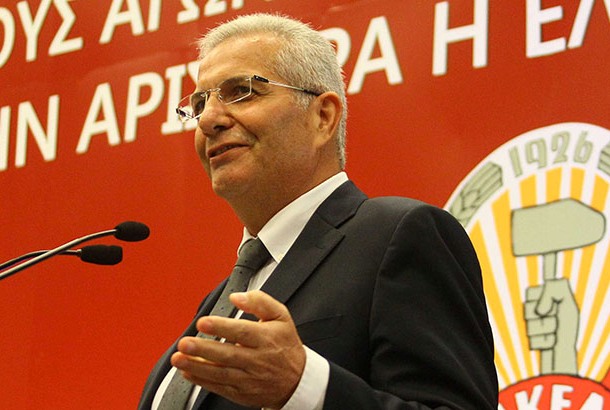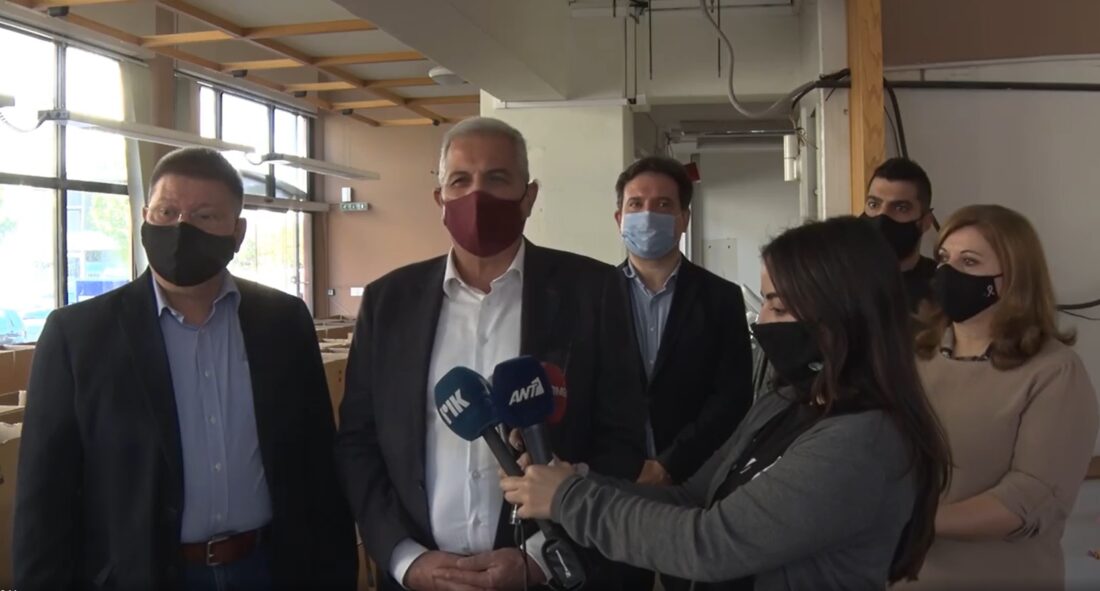
Speech by the General Secretary of the C.C. of AKEL
Andros Kyprianou at the 27th AKEL Famagusta District Conference
6th May 2017, Ayia Napa
On behalf of the C.C. of AKEL I greet the deliberations of the AKEL Famagusta District Conference. I hope a productive discussion will take place that will yield practical results, for the benefit of Cyprus, the District of Famagusta and our Party.
We are holding yet another Conference as refugees.
Yet another Conference which will above all reaffirm and reinforce the yearning for freedom, reunification, the return of the refugees and peace, as well as the struggle to fulfill all these goals.
Unfortunately, some forces and circles want to undermine our hope. Besides the haircut in the economy, they also want to undermine the efforts on the Cyprus problem. Day by day they are harming the prospects of reuniting our country. They are dismantling little by little all that we have achieved in recent years to destroy them in order to serve the re-election or election to the Presidency of the Republic.
Regretfully, this is demonstrated by developments themselves.
Mr. Anastasiades could – if he had wanted – prevented the crisis that was created. He could have referred from the outset the amendment tabled by ELAM on the Enosis referendum to the Supreme Court. He did not.
He could have asked the Attorney General for his opinion on the subsequent bill tabled by ruling DISY party, since there were reactions. He did not.
He could have sent a bill to the House of Representatives to correct the mistake made with the vote in favour of the amendment. He did not.
He could have not exercised his right to refer the law to the Supreme Court. He did not.
He deliberately chose to send the wrong messages about his intentions on the Cyprus problem. He chose to create a pretext for the Turkish side, instead of removing any pretexts whatsoever.
When the crisis began on the internal front as a result of the approval of ELAM’s amendment, AKEL was accused with regards the interruption of the talks. We were told that we were to blame for criticizing this development; that by doing so it became known and the talks were interrupted. All this when an event occurs and immediately becomes known all over the world.
When AKEL was trying to help towards overcoming the crisis and resume the talks, we were being accused of doing so.
We from the beginning called on the two leaders to find the strength and courage to move forward; not to give in to the sirens of demagogy and petty-electioneering or other considerations, leading Cyprus to adventures.
We urged Mr. Anastasiades to take a clear position on the House’s decision.
We called on Mr. Akinci not to render excessive dimensions to the fact.
We had meetings and contacts with Turkish Cypriot political forces, as well as with European Union officials to encourage them to help towards overcoming the impasse.
We urged the two leaders to refrain from making statements that would aggravate the climate.
We pointed out that the nationalist forces in both communities are making efforts to terminate the negotiations; that they are concerned about the possibility of progress being recorded and of reunification based on the agreed solution.
At the same time, we pointed out that parties with traditional democratic positions and principles, such as DIKO and EDEK, shifted their positions so as to meet the ultra-right ELAM’s positions. They forgot their democratic sensitivities by capitulating to populism and demagogic positions.
In the end, a draft bill tabled by DISY was passed in Parliament. Although we disagreed with its content, we overwhelmingly voted for it so that the negotiations could resume. Regrettably, Mr. Anastasiades chose to refer this bill to the Supreme Court. At the same time, he announced that we are facing a deadlock on the Cyprus problem, indifferent as to whether even small progress is recorded on the negotiating table. He subsequently went to India to find out whether there were any prospects for cooperating with Bollywood…There may perhaps be such a development, given that some forces are proving to be quite good in acting and showing a different side.
I have been asked many times lately whether AKEL “regrets its stand on the Cyprus problem during the period of the Anastasiades administration”. The question is quite wrong, for one very simple reason. AKEL did not change its policy on the Cyprus problem.
We remain consistent to our long-standing and timeless positions for the solution. We insist and stick to the principles and proposals put forward on the negotiation table since 2008. Based on these principles and proposals, we have supported with all our strength the negotiation procedure, which is the only way forward to find a solution to the Cyprus problem.
We therefore backed the negotiation procedure, not Mr. Anastasiades himself.
We strongly criticized the President every time his handling of the Cyprus threatened the procedure. I would like to point out that, during the first year of the Anastasiades Presidency, we were the only one party which was persisting and insisting that the procedure must continue from where it had left off during the Christofias governance.
We warned Mr. Anastasiades about the dangers emanating from any negotiation from scratch. He didn’t listen and the result was that we got back to the talks by suffering losses. Mr. Anastasiades, during all that time, complied with the orders of the so-called “intermediate political spectrum” that was applauding him frantically. What was the result? We did not have a substantive discussion. While we have justice on our side, we received the worst report submitted since 2004 by the United Nations. At the same time, the Turkish vessel “Barbaros” was roaming on our southern shores, in delimited and licensed areas, without anyone whatsoever among the international community defending us. That is where their approach leads to.
This is not the first time their policy has been tested and has failed. Unfortunately, whenever it was pursued, it not only failed, but we also paid a heavy price, while these forces are insisting that it is the recipe for our salvation. If the same tactics are pursued again, our country and people will pay the consequences, although this time we’ll suffer much more serious consequences.
There is no doubt that the main responsibility for the lack of progress on the Cyprus problem lies with the Turkish side due to its persistence on unacceptable positions. Regrettably, however, neither has our side shown the necessary determination and will.
At this point, I would like to clarify something that is deliberately and deliberately being distorted by various circles and forces maliciously. With this position of ours, we do not imply that Mr. Anastasiades has to make concessions on matters of principles. On the contrary. What we are saying is that Mr. Anastasiades must be decisive on procedural matters in order to probe the final Turkish intentions; to examine up to what point the Turkish side is willing to move. It will either accept positions in line with the agreed framework, or it will, at last, be exposed.
Mr. Anastasiades is referring the discussion of the issue of executive power to the end. He does so because guided by expediencies and considerations he is caught in the demonization of the proposals of D. Christofias. On his part, Mustafa Akinci is also referring the question of Morphou to the end. And Turkey declares that it will not reveal its position on the security issue if we do not reach a convergence on the aforementioned issues, as well as on the issue of the four freedoms for Turkish citizens and effective participation.
We propose that substantive internal aspects of the Cyprus problem should be discussed together as a package. There is a prospect of reaching an agreement on them if the convergences of the past and the discussions made in Mont Peleran are respected. If there is a successful outcome, then the way will be paved to put Turkey before its responsibilities as regards the core issue of security. If not, the whole project should be considered as null and void and that no commitment whatsoever for anyone should emanate. Even in this undesirable case, at least no one can blame the Greek Cypriot side for not having exhausted all possibilities for a solution. The responsibility for any potential breakdown will lie exclusively with the Turkish side.
If things are allowed to evolve as they are today, then the day after will be extremely difficult. There is a danger of the procedure collapsing. We address an appeal, but at the same time also a warning to Mr. Anastasiades. All possibilities need to be exhausted for a solution of the Cyprus problem. With insistence on principles and flexibility in tactics, every effort should be made for reach an understanding. If not, then the responsibility should be apportioned on the other side, otherwise Cyprus will find itself on moving sand. We urge him to cease focusing on the February 2018 presidential elections; to put the interests of the country over and above the idea of the presidential chair. He should do what he said Mr. Akinci to do, namely to think of the future of our children and grandchildren, of the coming generations and not about the next elections.
I want to focus particularly on the subject of the rotating Presidency. I do so because this position has been defamed and vilified as no other.
The first thing I want to say is that the principle of a rotating presidency has never been questioned by anyone. On the contrary, the only thing the late T. Papadopoulos sought was the increase in the members of the Presidential Council from 6 members to 9, who would be chairing in turn.
It is a fact that the Annan Plan was rejected. One could have said that the rotating Presidency has disappeared with it as well. But the truth is different. In the April 2005 summary of the National Council, which the representatives of Tassos Papadopoulos conveyed to the UN, the rotating Presidency was not included among the issues we wanted to discuss further. On the contrary, when in October 2008 Demetris Christofias presented his proposal to the National Council, the comment made by T. Papadopoulos was that it constituted an improvement from any previous proposal of the Greek Cypriot side.
In its essence, the proposal breaks down the walls of separation on the basis of ethnic origin and transfers any confrontation on to a political level, as all showing how modern states operate. This is achieved by both communities voting for the President and Vice-President. In this way, political parties are forced to look beyond the barbed wires of separation and work together to choose their chosen candidates.
It is by now clear that Mr. Anastasiades has prioritized his ambition to secure a second presidential term. However, one wonders what slogan he will project to the people this time. His policy of “I pledge to…” was exposed right from the very beginning as a result of the devastating decision taken for the haircut on bank deposits. The government’s well-advertised pledge of bringing a “new spring” has never been fulfilled. The supposed strong “leader” to tackle the crisis has failed miserably. So what will he say to the people? The facts are damning.
The middle class of Cyprus has been crushed.
One-third of the population is threatened by poverty.
Thousands of young people have migrated or do not return to Cyprus after completing their studies.
Unemployment remains at high levels. Employment rates are stuck at the end of 2014 levels.
The government says that it has carried out a radical social reform in social benefits. They have indeed done so – by cutting benefits. They took from the poor to give the poorest.
By pursuing a conscious policy, their policies have led to the wealthy becoming richer and the poor poorer. The only existing tax on wealth and immovable property has been abolished. This has established us as having the worst figures as regards the increase in income gaps within the European Union.
The grant for low-income pensioners fell by 64.3 million over the last four years.
Social benefits have fallen by € 79 million over the last three years.
All this has occurred at a time when wages have fallen to levels corresponding to those of the early 1990’s, while the cost of living is pursuing a frantic path.
The government and ruling forces has gradually dismantled the welfare state.
We have, for example, now ended up, and indeed we are talking about an abject reality, being included in the UN reports as among the worst offenders with regards the treatment of people with disabilities. Absence of care, lack of a strategy for the de-institutionalization of disabled people, an ineffective national action plan on disabilities, deficiencies on the issue of accessibility in the domestic and external environment and unsatisfactory public transport. All of these are added to the really tragic conditions prevailing in the public health sector. If we do not proceed decisively with the implementation of a General Health Scheme, perhaps the present generations will be the last to remember that Cyprus once had public hospitals, public health and a welfare state.
There is a great need to change things. We need to fight so that we are not the last generation to remember the Cyprus of gains and rights; that we once had hospitals, doctors, a welfare state and a future.
The main political force that can bring this future is AKEL. However, AKEL is not just its General and District Secretaries. AKEL is each and every one of us, all of you. AKEL is all the people that for decades have been unselfishly and proudly supporting our Party. We have to become a great deal stronger if we want to move forward.
Conclusions are never enough. It is not enough to debate and talk with each other again. A lot of important work has been done during the recent municipal elections, which has restored to some extent the losses we sustained at the parliamentary elections. But we have many things to do to create the conditions for AKEL to fully regain the position it deserves.
The District Organization must play its leading and guiding role in this direction. We must be very strict, beginning first of all with ourselves. There shouldn’t be any member of the District Committee without specific duties. There is no member of the District Committee who mustn’t meet his/her duties as a Party member and cadre. The times are difficult, our full-time party mechanism has been reduced. Our duties and tasks can only be fulfilled if volunteers also make their own contribute. There is no room for pessimism and grumbling. If each of us talked less and worked more then things would be very different.
We’ve said it many times. The Party base organization is the core and essence of the Party. That’s where our efforts should focus on; on the recruitment of new members, on the renewal of the party base organizations, on the daily contact with the people and the strengthening of our intervention with regards local problems. By saying so, I stress the importance of a free and frank dialogue between us, as well as of criticism but also self-criticism.
It is up to us whether AKEL will take the next step; whether it will be stronger. We have a rich and proud record as regards our presence and service to the country for nine decades. But history is before us.
We want a united and politically, organizationally and ideologically powerful Party.
We want a Party with a comprehensive political proposal on the small and big issues that concern the country, but also a Party with a consistent presence inside and outside the House of Representatives – everywhere where there are struggles being waged for political, labour, social and human rights.
We want a strong Party and a powerful People’s Movement of the Left that can lead and be at the forefront of the political and social struggles that lie ahead of us, with the consistency, seriousness and credibility that characterize it.
We want a Party that is the alternative voice, the strong voice of all Cypriots; a powerful voice that asserts for all Cypriots reunification, peace, progress and prosperity.
This is AKEL – the Party on which the people have always pinned their hopes on for a better future.





